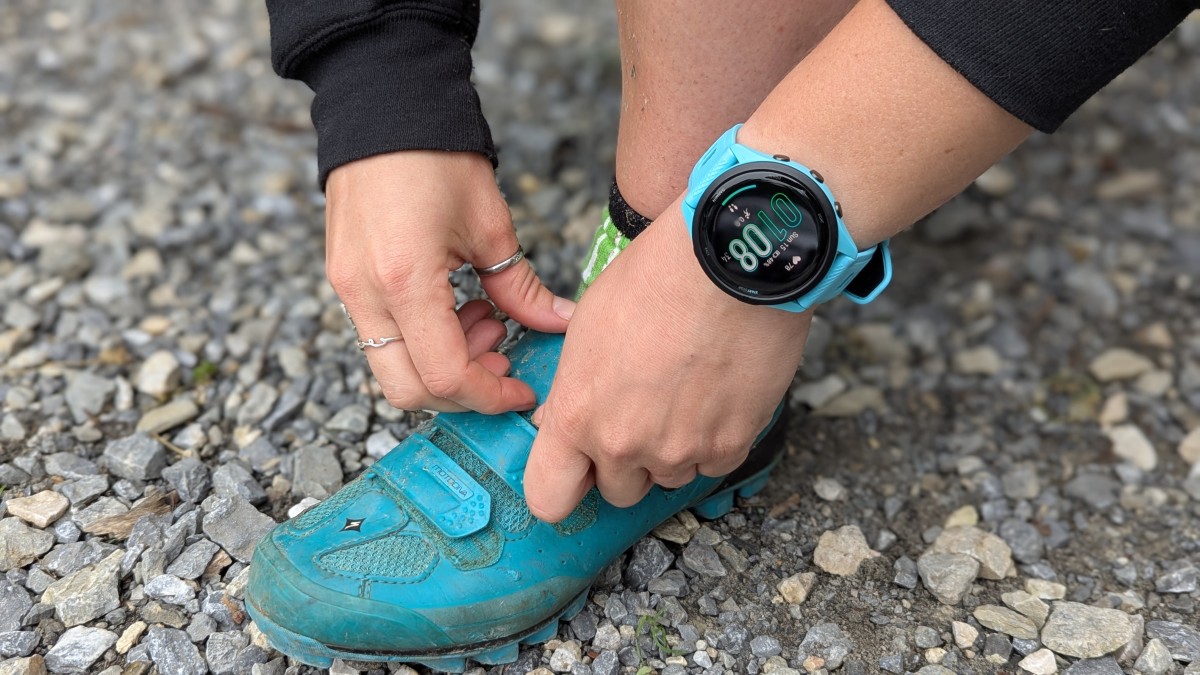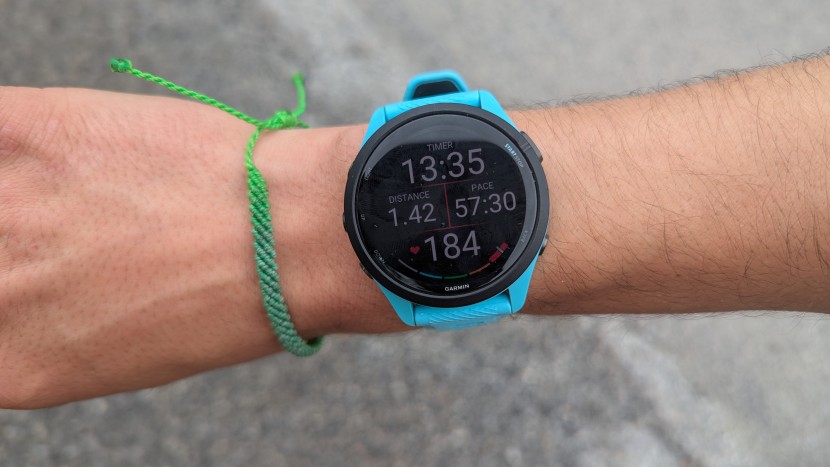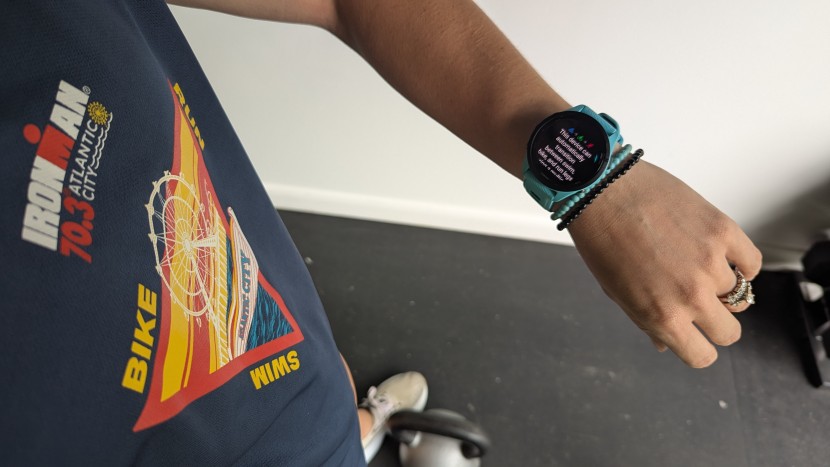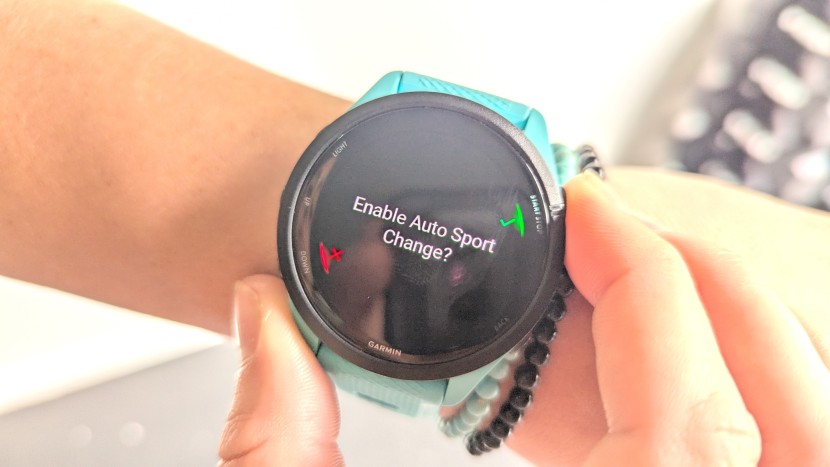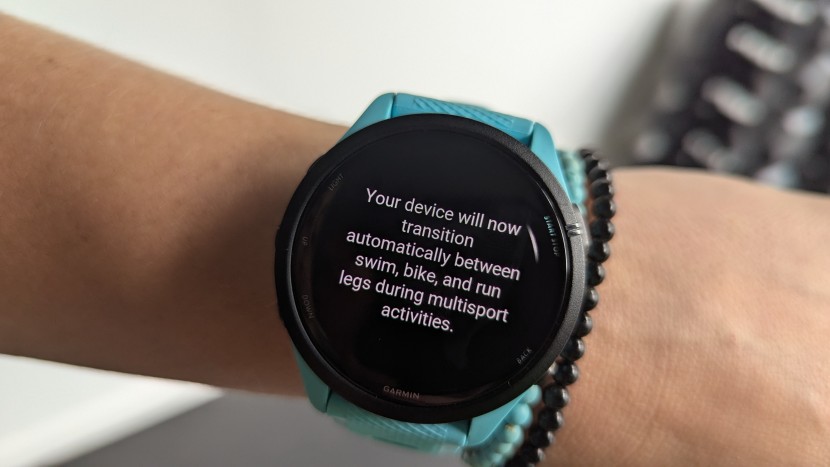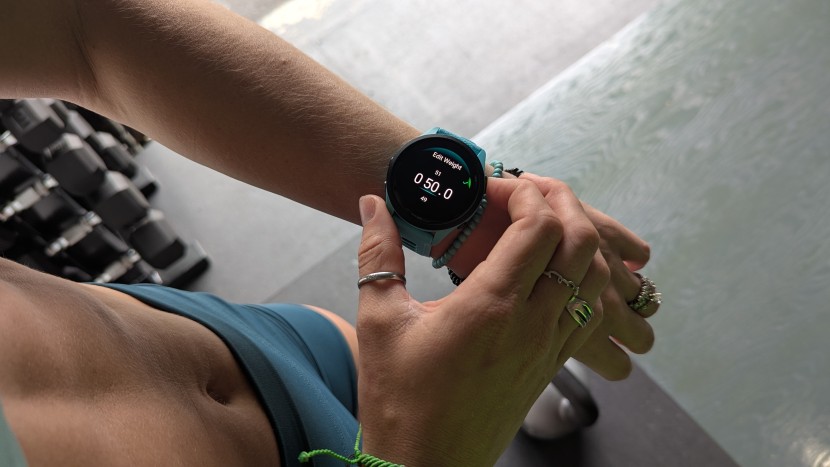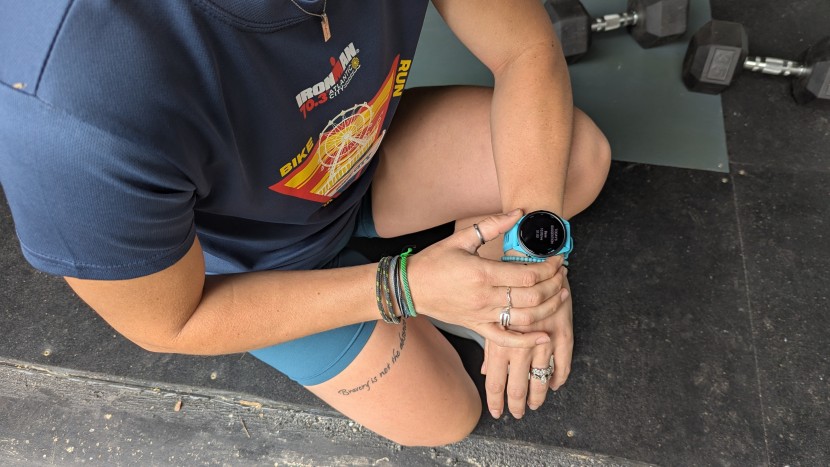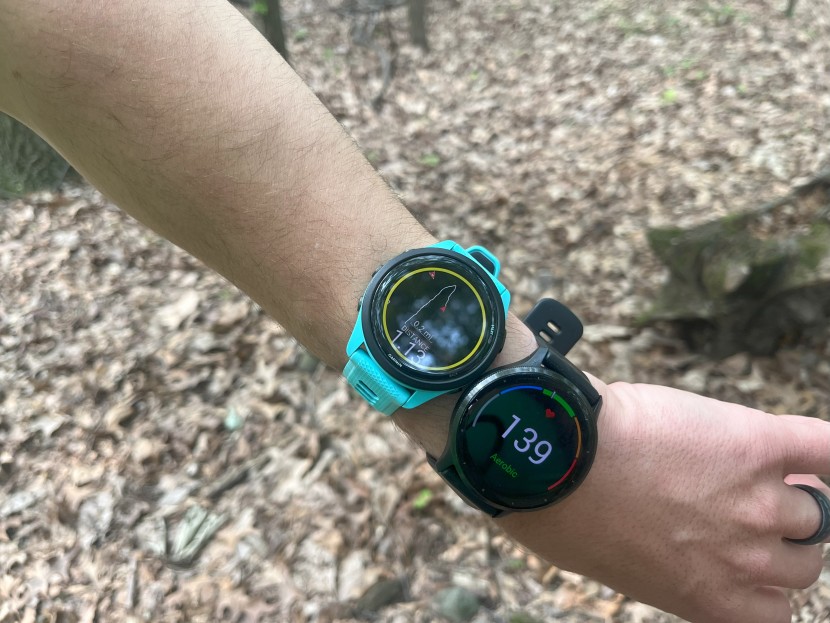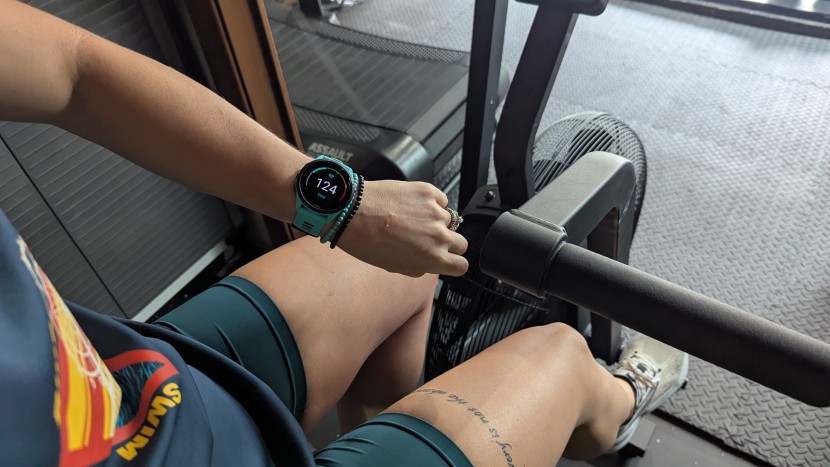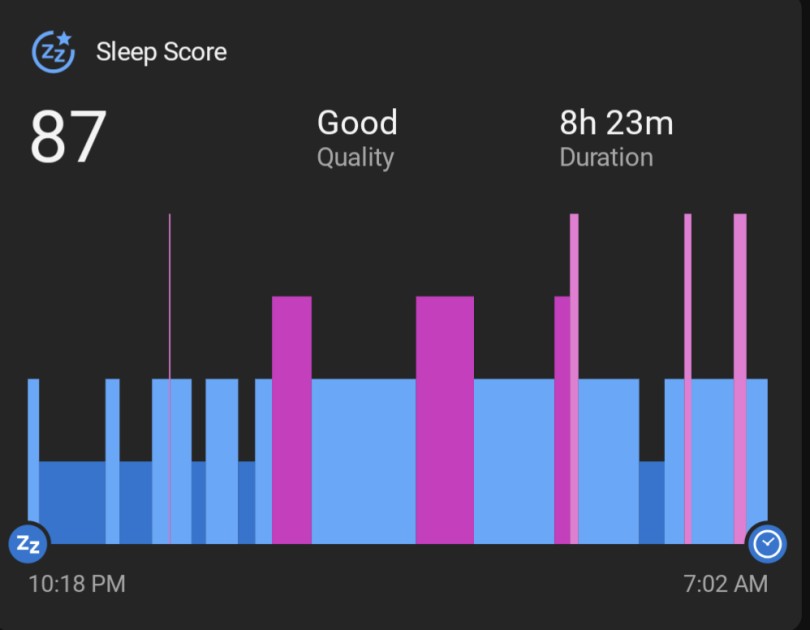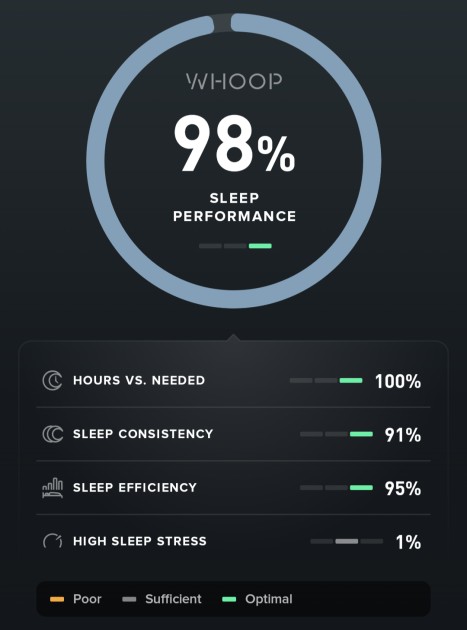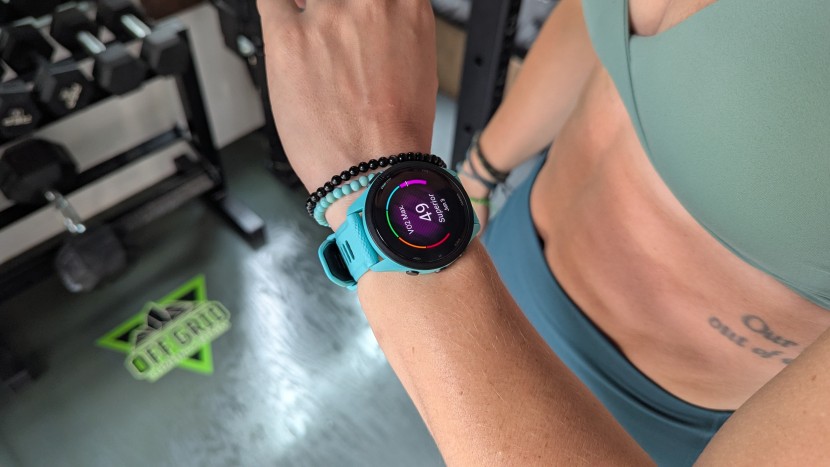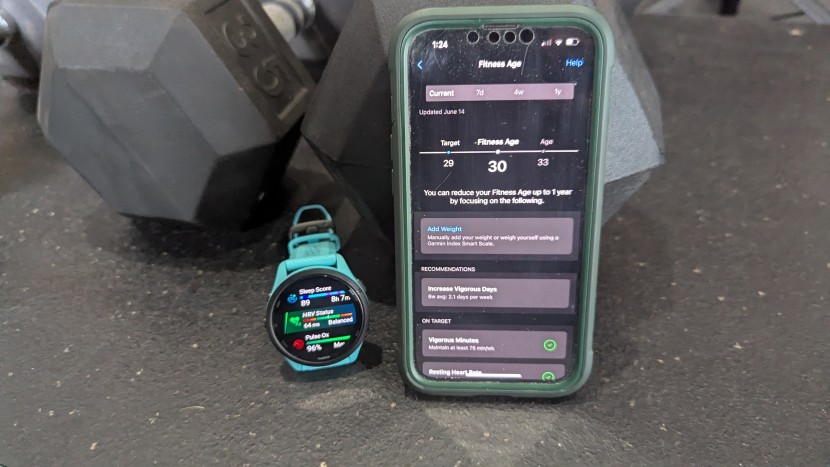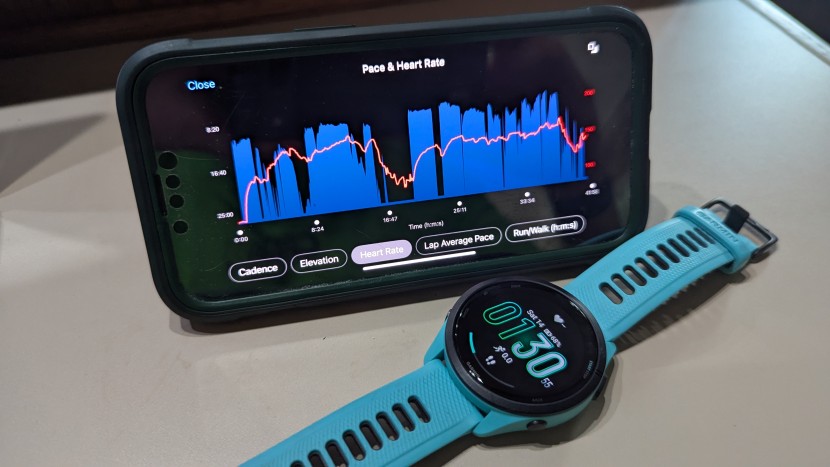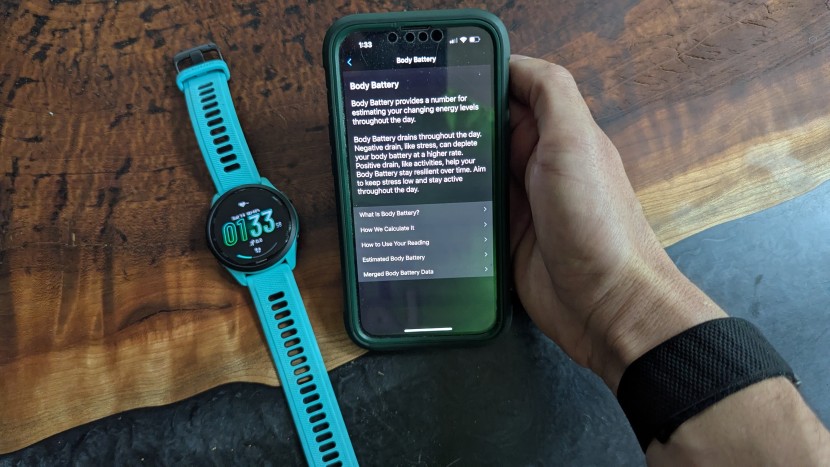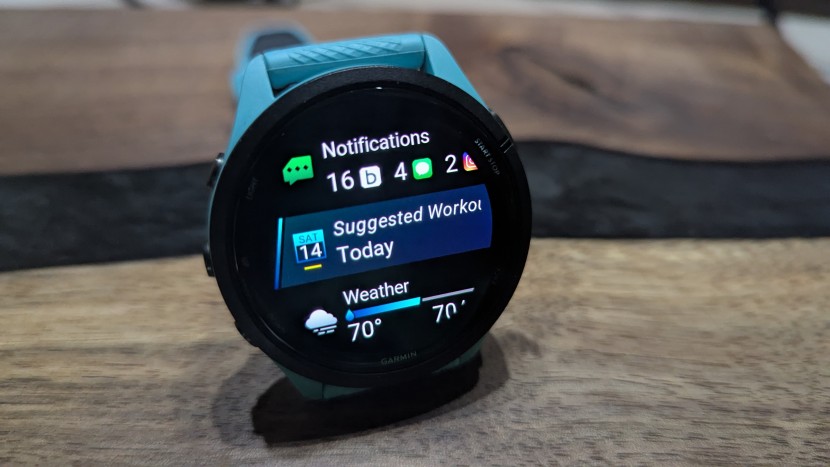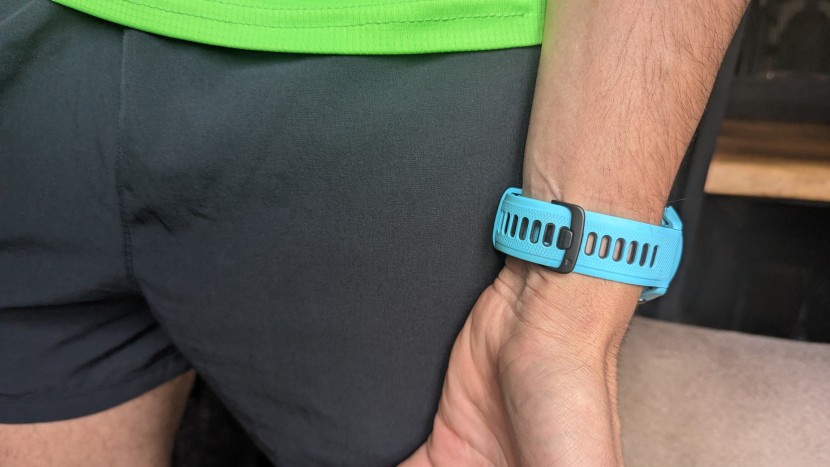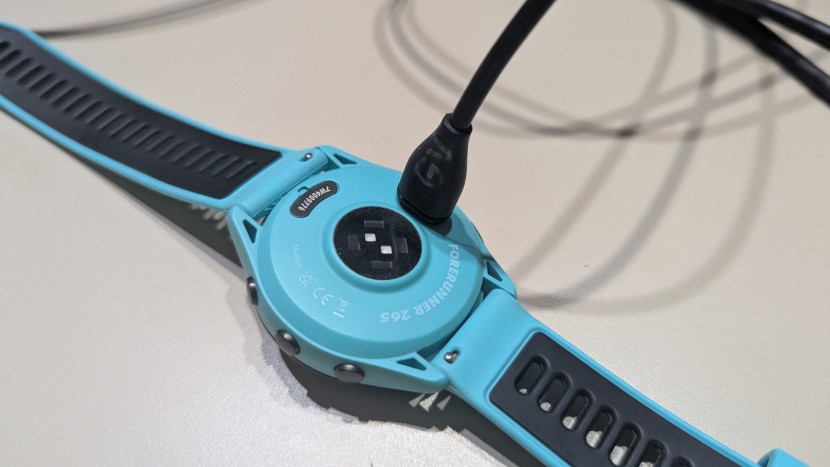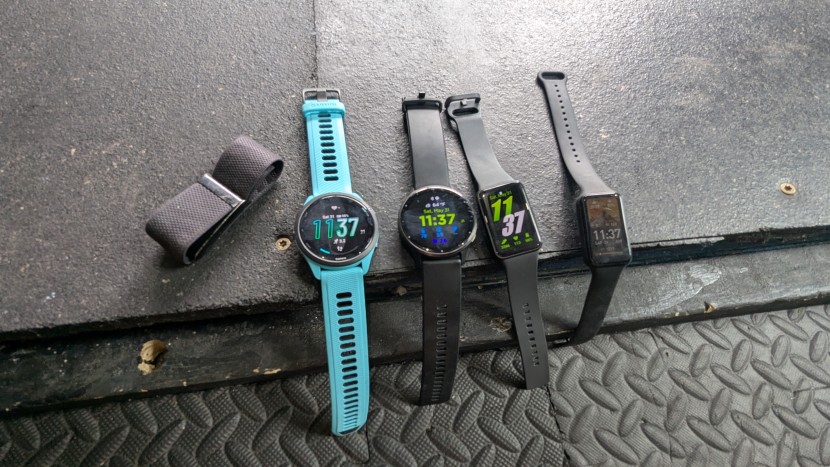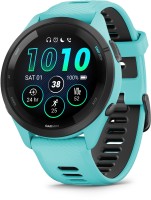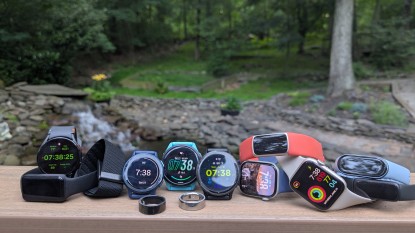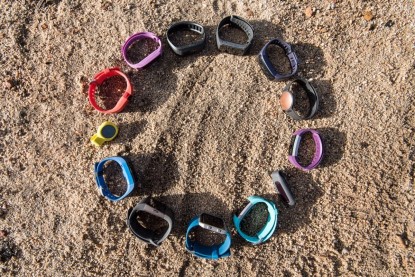
Our Verdict
Our Analysis and Test Results
Garmin watches are a popular choice among amateur and professional athletes, and there's a dizzying variety of options to choose from depending on your specific needs. We found the Forerunner 265 to be an excellent option that is easy enough to learn, with just the right amount of features for athletes of any caliber to accomplish their fitness tracking needs without breaking the bank for a ultra-high end model like the Garmin Enduro 3 that costs almost double. Though the Forerunner 265 isn't the most economical option in our lineup, for fitness enthusiasts who want GPS navigation, elevation features, and advanced multi-sport tracking, this is a fantastic and easy-to-use option.
Activity Tracking
The Forerunner 265 boasts some of the best activity tracking out of all our fitness trackers thanks to advanced GPS & elevation sensors, intuitive buttons, a large touch screen, and accurate metric recording across a variety of activities. We tested the Forerunner on runs, hikes, bikes, and more, considering how well it is able to track different types of cardio and gym workouts, how well it could auto-detect activities, and any other type of activity tracking we could conceive of. With few exceptions, we feel the Forerunner 265 is an exceptional option for athletes of any kind and caliber.
Cardio Tracking
Tracking cardio activities like running, hiking, biking, and even triathlon is where the Forerunner delivers the most value, and justifies its price point as a premium fitness tracker. Across most of these activities, we were able to view distance, pace, and heart rate data, as well as more advanced metrics like running dynamics, running power, navigation fields, heart rate zones, and even a compass. Cyclists will enjoy many of the same metric tracking features as they do for running, but a paired power meter will be required for power and cadence metrics.
The accuracy of the available data is great. We compared distance and pace fields to measured values, and real-time heart rate data to a chest strap monitor. One of our testers noted that “I was really impressed with the accuracy of the real-time heart rate data, especially the max heart rate. As a slowly aging athlete, I love seeing the real-time feedback that I can still hit my target thresholds during a workout”.
During swim workouts, the Forerunner can track activities in both open water and the pool, recording distance, heart rate, pace, stroke count, and laps if applicable. It calculates metrics such as your swolf score (split plus strokes) and even your Critical Swim Score, which is the theoretical pace you could swim at without exhaustion. For triathletes, brick workouts, and full triathlons can be automatically tracked, including your transitions.
During an activity, we found the data fields easy to view and navigate between. We loved using the buttons for navigation while sweaty, wet, or running since a touch screen can be challenging given those conditions.
Immediately on completion, the Forerunner allows you to add a perceived effort score, and provides a workout summary including total distance, time, and pace, heart rate over time, elevation gain and loss, training effect & load, training status, and estimated recovery time. There are options for even more detailed analysis visible both on the watch and in the Garmin app.
Workout Tracking
Workout tracking on the Forerunner 265, for things like a strength workout in the gym, machine exercises, or yoga, is not quite as robust as the cardio features we experienced, but still above average and enjoyable to use. Overall, you lack the ability to track as many metrics, but the pre-built and custom workout features are great.
There are a variety of prebuilt workouts in the Garmin app, with different objectives like strength, fat-loss, cross training, or sport-specific goals. While the library of workouts isn't comprehensive enough to exclusively rely on, it's a great way to get started, get ideas, or fill in a gap when you don't have a pre-planned workout. For those who can plan ahead, you can build a custom workout to send to your Forerunner. Create your rep and set scheme, select from hundreds of exercise options, and even leave yourself 15-second voice note reminders about the exercise. Once saved, you can select it on your watch.
Workouts on your watch display a video demo of the exercise, along with the reps and weights you need to complete. You can also still scroll data screens to view your heart rate & zone, elapsed time, and calories burned. Your Forerunner, based on your prompting, will advance to the next set or rest, and count down for you so that you can stay focused in the gym.
Repetition counting on the Forerunner, like most watches we tested, is spotty and inaccurate. We were impressed that it accurately counted pullups, given that our arms weren't even moving, but dismayed when it miscounted the majority of our squats and regularly missed several bench press reps each set. Still, the ability to manually adjust both the reps and weight after each set is the fail-safe; just don't rely on the Garmin to count for you.
Auto Detect for Walks/Runs
The Forerunner 265 won't auto-detect and start a run or walk for you. Although Garmin does have MoveIQ, you can't start a run and expect the Forerunner to prompt you to start activity tracking like some other trackers we tested. For data lovers looking to maximize their tracking capabilities, this probably isn't an issue, as with any auto-detected activities, you'll typically lose a couple of minutes of data! Even without auto-detection, starting an activity is easy. Press the same button three times, and you've started your top-listed activity on the Forerunner.
Other Tracking Features
The Forerunner 265 has an impressive amount of trackable activities, and you can also create custom activities to track based on existing profiles. Beyond just activity tracking, though, we loved that the Forerunner offers suggested workouts to follow, as well as navigation-supported activities and virtual pace partners. Once you set up routes, you can have the Forerunner provide navigation guidance or alerts on pace. You can also get navigation guidance to redo past workouts in the same direction or reverse.
The GPS and elevation tracking on the Forerunner are excellent. Many of the trackers in our lineup forego altimeters and rely on map overlays to estimate elevation change. For mountain athletes, the inclusion of real-time elevation tracking is critical, along with the outstanding GPS & navigation aids such as saving your location, navigating to a destination, and navigating back to your start point. This last feature can be accomplished using both straight line guidance or reversing your path.
Lifestyle Tracking
The Forerunner takes accurate heart rate readings in real time, and also provides a wonderfully in-depth sleep tracking analysis. There's a handful of other advanced health metrics that you can track as well.
Heart rate tracking is available on the Forerunner both during activities and normal wear of the watch. We compared live heart rate data against a Polar chest strap monitor and noticed minimal discrepancies between the two. One of our testers said that “With the Forerunner 265, I have accurate heart rate and zone data available right on my wrist, which is so much easier than strapping on a chest strap and looking at my phone”. When pushing to hit our max heart rates, the Garmin was responsive and peaked right with us. The Forerunner can also take continuous HR readings outside of an activity if you select that setting.
Our self-described professional sleep tester noticed no issues or concerns with the sleep tracking data on the Forerunner. We felt that the device accurately and quickly picked up on both sleep and wake times. We're big fans of the morning sleep summary for a quick view of our sleep performance and appreciate that you can view even more detailed data in the app. In addition to your sleep score, stages, and times, the Forerunner tracks your resting heart rate, restless moments, breathing variations, SpO2, respiration, overnight HRV, and average skin temperature change. That's a lot of data!
While the Forerunner is certainly consistent with your sleep scores, we also found it lower on average than other trackers on the same night's sleep. One of our testers noted, “My weekly average sleep score on my Forerunner was a 73, but on the Whoop for the same seven nights it was 91. On their own, either sounded plausible, but comparing the two, I felt the truth was probably on the higher end of the spectrum”. We've read many people's comments that Garmin sleep scores are low, and while we didn't find them wholly inaccurate, they were typically lower than other trackers. Most importantly, though, Garmin is at least consistent with its scoring, so you can adjust to whatever curve it applies.
Beyond heart rate and sleep data, the Forerunner 265 can help you track a variety of advanced health indicators and metrics. Some of these may be useful for medical reasons, and some are helpful for athletes looking to understand more about their recovery and training. The Forerunner can automatically track your heart rate variability (HRV) and VO2 Max, and you're able to take readings of your blood oxygen saturation, respiration rate, or Pulse Ox. Other metrics the Forerunner tracks are steps and flights of stairs, thanks to the built-in altimeter. Though it requires manual input, you can also use your Forerunner to track weight changes, menstrual cycles, and caloric intake.
Combining the various metrics and data sources, Garmin provides several calculated metrics such as your Body Battery, an estimate of your overall energy levels that factors in stress from activities, workouts, and your day, as well as recovery efforts such as rest and sleep. It also calculates a Training Readiness score, which factors in sleep, recovery time, training load, and more, to estimate your readiness to push in your next training session. There's also your Fitness Age, which determines your relative fitness age based on activity intensity, resting heart rate, and body fat percentage, and provides recommendations on how to improve.
Data & Dashboards
We believe the key to improvement is understanding and interpreting the data that your device tracks. After our testing, we determined that the Forerunner 265 and associated Garmin Connect app are fantastic for viewing your basic and advanced activity and health data with ease. There is a slight learning curve to the app, but it's highly customizable and provides excellent data analysis and advice.
The Garmin Connect app has graphs and insights for every tracked metric. We really love the customizable home screen, with Today's Activities displayed prominently at the top. The Garmin Connect app does a great job prioritizing activities, which we found were occasionally buried deep in other trackers' apps. There's also a customizable In Focus carousel with charts and trends, and then once again a customizable At a Glance section for quick views of metrics and scores. All of these panels can be clicked into to open up a more detailed view.
The level of detail and analysis that Garmin provides is impressive. Not only do you get the data, but you get digestible insights and analysis of your data that help you better understand why you are where you are. Charts like your sleep score frequently have the ability to be overlaid with additional data, so that you can compare two data sets in one.
One of our testers really liked the running and fitness chart overlays. He stated, “I loved the different overlays comparing my heart rate data to elevation, cadence, and pace data after a run. That level of detail helped me further understand how different performance components are related, and where I can focus to improve”.
Features & Ease of Use
We really loved the tactile buttons on the Forerunner, and were reasonably pleased with the notifications and phone integrations, but note it fell short of others like the Garmin Venu 3 for its overall intuitiveness and comprehensive smart-features. The Forerunner offers a variety of functions and data analysis, all without a subscription. Some features, like new watch faces or data screens, can be purchased via third-party developers.
Setting up the Forerunner is easy, and pairing it with your phone and the Garmin Connect app is a relatively painless process. You are also able to start using it right away. Though trend data will take a week or more to start generating, you'll be able to capture heart rate and sleep scores from day and night one. We like the Garmin Connect app, which contains graphs for every tracked metric. We have read of some users who dislike it, but it works well in our opinion, and we feel that it is easy to access our data and gain insight into our fitness level.
The Forerunner doesn't separate out traditional apps, like your clock or alarms, weather, etc, from activities like a run. A short list of activities is accessible on a single screen that you can customize. We particularly liked the folder-based view of complete activities, broken into categories such as running, cycling, outdoor, winter sports, and more; it made it very easy to find the activity we were searching for quickly. You can also create custom activities.
The Forerunner 265 enables you to receive and, on Android phones, respond to text messages with customizable quick responses. You also have call accept and deny features right on the watch; however, you'll need to have your phone paired and in range, and need to communicate through your phone. iPhone users can receive and view texts, but not respond. Garmin connects to third-party apps like Strava, making it easy to share workouts, and has the Garmin Wallet feature for contactless payment. We were impressed with some of the other smartphone integrations as well, such as a weather app and a calendar app, that allow a detailed view on your watch. The only downside is you'll need to be connected to your phone for updates.
Wearability
The Forerunner is not only one of the largest watches in the lineup that we tested, but it's also the most distinctly sporty; it's going to stand out as a watch that is tailor-made to track fitness activities with precision. Though it is large, we don't feel it is excessive. One of our testers noted, “I have slim wrists, and frequently avoid anything close to large watches, but this still felt comfortable on my wrist and didn't look out of place”. The band is highly adjustable with latch points along the entire length.
Battery
The Forerunner 265 claims to last an estimated 13 days in normal smart watch mode, and we found this to be accurate, even with daily activity tracking and constant heart rate monitoring. We were really impressed with the duration, meaning no need to worry about chargers on a short backpacking trip or weekend away. Even with the most intensive GPS options running, the Forerunner lasts between 6 and 20 hours, depending on options, making it ideal for a long day in the mountains or woods.
Should You Buy the Garmin Forerunner 265?
The Forerunner 265 is an outstanding fitness tracker for the dedicated data lover or the athlete who wants to accurately track activities with metrics including heart rate, GPS routes, or elevation data. With advanced navigation features and a long battery life, the watch is also ideal for those who venture off-trail or away from civilization for extended periods of time. Compared to some of the most elite GPS watches, the Forerunner is at an attractive price point with a variety of features to help you meet your fitness goals.
What Other Fitness Trackers Should You Consider?
If too much data sounds overkill, there are some other trackers that will be a little easier to pick up and understand from day one. The Garmin Vivoactive 5 still tracks many of the same activities as the Forerunner but in a slightly less intimidating package. It's much smaller and a fraction of the cost of the Forerunner as well. Yet another Garmin that might meet your needs better is the Garmin Venu 3. It offers many of the same advanced metrics and navigation tracking as the Forerunner, but includes more smartphone features like on-watch calls & audio, and has a slim & sleek style. While the Forerunner is great at tracking activities and has an excellent live heart rate view, it does fall somewhat short in the overall lifestyle tracking & coaching realm. The Whoop 5.0 is the counter to that with best-in-class lifestyle tracking, data analysis, and coaching predictions to help you live your best life. The Whoop isn't nearly as good for activity tracking; we've seen some of the most dedicated and health-obsessed individuals use both the Whoop and a Garmin to round out their tracking.
| Awards | Best for Multi-Sport and Cardio |
|---|---|
| Price | $450 List Check Amazon (on sale!) |
Overall Score  |
|
| Star Rating | |
| Bottom Line | This advanced tracker excels for athletes looking to up their data tracking while on the road or trail, thanks to outstanding GPS and a great user interface |
| Pros | Outstanding activity tracking data and accuracy, GPS & elevation tracking, button & touch screen interface, great battery life |
| Cons | Bulky, expensive |
| Rating Categories | Garmin Forerunner 265 |
| Activity Tracking (20%) | |
| Lifestyle Tracking (20%) | |
| Data & Dashboards (20%) | |
| Features & Ease of Use (20%) | |
| Wearability (10%) | |
| Battery (10%) | |
| Specifications | Garmin Forerunner 265 |
| Measured Weight | 1.6 oz |
| Measured Dimensions | 2.0" x 1.9" |
| Measured Heart Rate Accuracy | 96.55% |
| GPS Tracking | Yes |
| Supported Operating Systems | Apple iOS & Android OS |
| Water Resistance | 5 ATM |
| Altimeter (Elevation) | Yes |
| Screen Type | AMOLED |
| Sensors | Altimeter Accelerometer Ambient Light Barometer Blood Oxygen Compass GPS Gyroscope Heart Rate Thermometer |
| Claimed Battery Life | Smartwatch mode: Up to 13 days GPS-Only GNSS mode: Up to 20 hours SatIQ (AutoSelect) GNSS mode: Up to 16 hours All-Systems GNSS mode + Multi-Band: Up to 14 hours GPS-Only GNSS mode with music: Up to 7 hours SatIQ (AutoSelect) GNSS mode with music: Up to 6.5 hours All-Systems GNSS mode + Multi-Band with music: Up to 6 hours |
| Smart Features | Notifications Preset Message Response Wallet Music Control |
| Trackable Activities | Run Hike Cycle Multisport / Triathlon Navigate Strength Swim Paddle Sports / Team Sports Snow Sports Yoga |
| Trackable Lifestyle Metrics | Blood Oxygen Flights Heart Rate Sleep Steps Stress |
| Safety Tracking Features | Incident Detection During Select Activities, Incident Detection Alert on Phone for Wearables, Assistance, Livetrack, Live Event Sharing (Android Only) |
| Other Data Tracking Capabilities | Advanced Running Metric Tracking Advanced Cycling Metric Tracking Advanced Swimming Metric Tracking Outdoor Navigation Features Cycle Accessory Compatible Womens Health Data Entry & Tracking |
| Coach / Predictive Assistance | Sleep Coach Readiness Coach Training Tips Health Tips |


